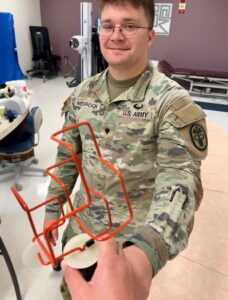
Pictured: Wesbrock hands wrist maze to one of his patients during her occupational therapy appointment.
Story by Jean Graves
Bayne-Jones Army Community Hospital
FORT JOHNSON, La. —Bayne-Jones Army Community Hospital proudly recognizes the achievements of Spc. Andrew Wesbrock, an occupational therapy specialist at the Joint Readiness Training Readiness and Fort Johnson, Louisiana who recently earned civilian credentials through the National Board for Certification in Occupational Therapy.
Wesbrock, a self-proclaimed Army brat, enlisted in the infantry right after high school and said an injury, requiring tendon reconstruction surgery, sidelined his infantry career and forced him to reclass or leave the military.
“My recovery and rehab took several months and introduced me to the field of occupational therapy,” he said. “I chose to reclass as an OT specialist because it seemed interesting, I enjoyed my personal experience as an OT patient, and I knew I would earn a degree at the end of my training.”
Capt. Han Yoo, commander, Alpha Company, 264th Medical Battalion at the U.S. Army Medical Center of Excellence said becoming a 68L occupational therapy specialist is difficult but rewarding.
“If anyone is looking for a medical military occupational specialty that has direct translation to the civilian sector and potential employment, this job would absolutely be one of them,” he said. “Our 36-week didactic and clinical program is accredited by the Council for Occupational Therapy Education.”
Yoo said OT specialists in the Army are held to a higher standard of regulatory requirements and professional development through continuous education.
“Spc. Wesbrock carries on the legacy and heart of the Army’s 68L program,” he said. “He was the distinguished honor graduate when he was a member of Alpha, 264. He completed all assigned tasks to the highest standard every time.”
Yoo said Soldiers, like Wesbrock, who successfully complete the requirements for this MOS will earn an accredited associate degree from The College of Allied Health Sciences, in coordination with Uniformed Services University.
“We usually encourage our students to pursue a national certification exam, administered by the National Board for Certification in Occupational Therapy, during their second phase of training,” he said. Our program has a 75% first-time pass rate, so our students are well-prepared,” he said.
Lynn Foster, client management specialist for the NBCOT said the exam is four hours long and includes 190 questions.
“All fifty states plus the District of Columbia, Guam, and Puerto Rico require that an individual take and pass the COTA exam after graduating college before they can get a license to practice in the civilian sector,” she said.
“By passing the exam and becoming certified, Spc. Wesbrock has proven he has required entry-level knowledge to begin working in the field.”
Maj. Caleb Johnson, chief of rehabilitation services at BJACH said obtaining this certification speaks to Wesbrock’s commitment to his patients and profession.
“BJACH employs intelligent, highly qualified, and motivated Soldiers, like Spc. Wesbrock. They are driven to provide high quality patient care consistent with the industry standard,” he said. “The COTA credential is not an easy exam. It takes dedication and work to learn the required content and implement it within the clinic.”
Johnson said he’s proud of Wesbrock and the entire rehab department.
“Our Soldiers embody the ‘Be, Know, Do’ philosophy,” he said. “They desire to become the best at their individual craft. They strive to be lifelong learners. And they provide high quality care to all BJACH beneficiaries.”
Wesbrock said he loves being an occupational therapy specialist and looks forward to continuing in the field when he leaves the military.
“I am proud knowing I make a positive impact on my patients’ journey to recovery,” he said. “I was that guy who was hurt and thought I would never get better, but I did, and now I get to help others.”
Wesbrock said taking the exam and earning the COTA credentials is important.
“It shows that you are an expert in the field,” he said. “Now I can take more courses and become certified in other areas like strength coaching, pool therapy, and nutrition.”
Wesbrock plans to leave the military and return to Texas next year.
“I still have a way to go to prepare for my military transition,” he said. “In Texas, to obtain a license, I will also need to pass a state exam.”
Editor’s Note: The BJACH Occupational Therapy Department sees all beneficiaries (active-duty Soldiers, retirees, and Family members) with a referral.
To find out more about how to become an occupational therapy specialist (68L) visit https://www.goarmy.com/.